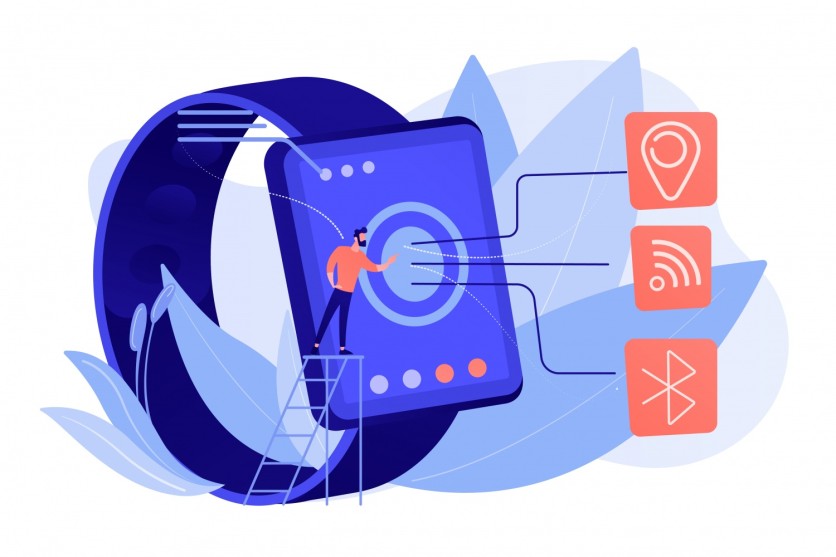
From smartwatches to heart monitors and continuous glucose monitors, the advent of artificial intelligence has revolutionized the healthcare industry. Wearables have become less noticeable and more effective in monitoring patients. These advancements have helped bridge the gap between doctor and patient, while adding efficacy to remote patient monitoring.
Read on to learn how AI is improving the functionality of wearable devices in healthcare.
ECG Monitors That Leverage AI's Healthcare Potential Can Help Detect Abnormal Heart Rhythm
Heart rate monitors have become a common feature in fitness activity trackers and smartwatches. Wearable heart monitors, apps included, can share crucial information like abnormal heart rhythm, with a patient's doctor sooner, leading to better health outcomes.
Using the machine learning concept and complex algorithms, AI can detect potential signs of structural heart disease and arrhythmias like atrial fibrillation in an early phase.
AI is trained by using a deep neural network model and analyzing heart sound recordings. The machine can detect murmurs too faint for a human ear to detect when using a stethoscope. Case in point: The Food and Drug Administration recently cleared stethoscope maker Eko's AI-powered Eko Murmur analysis software. With the device and the AI working hand in hand, murmurs and the severity of them are more easily and speedily detected.
In 2022, Apple announced that over 100 million people worldwide own Apple watches. That's a lot of heart data thumping around. The devices have long implemented electrocardiogram technology and the power to detect irregular heartbeats. Since 2018, Apple has had approval from the Food and Drug Administration to help atrial fibrillation patients track the frequency of their irregular heart rhythm.
Leveraging AI's Healthcare Tools to Monitor Fertile Windows, Menstrual Cycles, and Pregnancy
The growing smart fertility tracker market is also getting an AI boost. Wearable medical devices gather information about body temperature, ovulation cycle, hormonal changes, and other physiological parameters. Cisgender women use the apps to plan or prevent pregnancy, or to monitor menstrual disorders and their symptoms.
Still, the devices and their correlating apps are best used by cisgender women with relatively regular menstrual cycles, somewhere between 23 and 35 days. If it's out of that frame, the data might become unreliable, but future versions of these wearables could improve that aspect.
Wearable technology and AI's healthcare capabilities could be combined to monitor pregnancy. The idea is the same: The device collects relevant data on parameters that change during pregnancy. Comparing it to the database can help detect risks at an early stage. For example, the device might warn about potential preeclampsia symptoms or premature birth risks based on the information provided. The healthcare provider will get actionable insights and can act accordingly.
Wearables Assist Healthcare Providers by Enabling Remote Monitoring and Reducing House Visits
The pandemic has accelerated the focus on telemedicine and the adoption of remote consultations and monitoring. Providers who rely on AI's healthcare-related data receive feedback from a patient about their health condition, but the information might be incomplete or not even totally accurate.
Wearable medical devices that monitor different parameters are far more reliable and are capable of catching changes that could point out potential health issues. Some London-area hospitals, such as Dartford and Gravesham NHS Trust, have already partnered with companies working on these AI-powered apps that provide detailed info about patient parameters.
The hospital focused on monitoring patients with chronic conditions after discharge. A smart device would collect information about the vitals and then compare them with the database. The initial results noted a 22% drop in unnecessary visits to the patient's home, which enables better focus on patients with actual risk. Patients who present with a high risk of falling or infection also benefit from the tech, and receiving at-home medical attention.
AI's Healthcare Edge: How Does Smart Activewear Work?
Activewear includes clothing pieces and wearables specifically designed for spending time outdoors, working out, or sports.
Some companies have developed activewear equipped with sensors that can detect even mild vibrations. A user's clothing can tell if they are striking the right position for a yoga pose, potentially avoiding strains and other injuries.
Gathering information about different aspects of exercise can also be essential to identify how to improve your body shape or workout aspects. FSR, or a force sensor resistor, uses electrical resistance to show the force applied to an object. This can help discover whether particular muscles or those on one body side are stronger than the other. You can also monitor how adjusting your body position affects the measurements received by FSR.
The Future Is Exciting for Wearable AI's in Healthcare
Wearable medical devices have already done a great job in promoting a proactive health approach. Fitness trackers monitor your heart rate and other parameters to help you get optimal exercise. Smart devices can assist in uncovering and improving your sleep patterns and remind you about taking medications, exercising, and other activities.
Gathering extensive information about heart rhythms, hormonal changes, and other parameters helps AI compare that data to the extensive database available. Thanks to AI's capabilities, that approach is used to detect and warn about any abnormalities. It can be a decisive factor in discovering health-related issues in the early stages. That actionable insight helps healthcare providers identify patients at actual risk and ensures they get the right care and treatment. The future is now with AI helping patients and their caretakers promote a healthy lifestyle worldwide.
![Apple Watch Series 10 [GPS 42mm]](https://d.techtimes.com/en/full/453899/apple-watch-series-10-gps-42mm.jpg?w=184&h=103&f=9fb3c2ea2db928c663d1d2eadbcb3e52)



